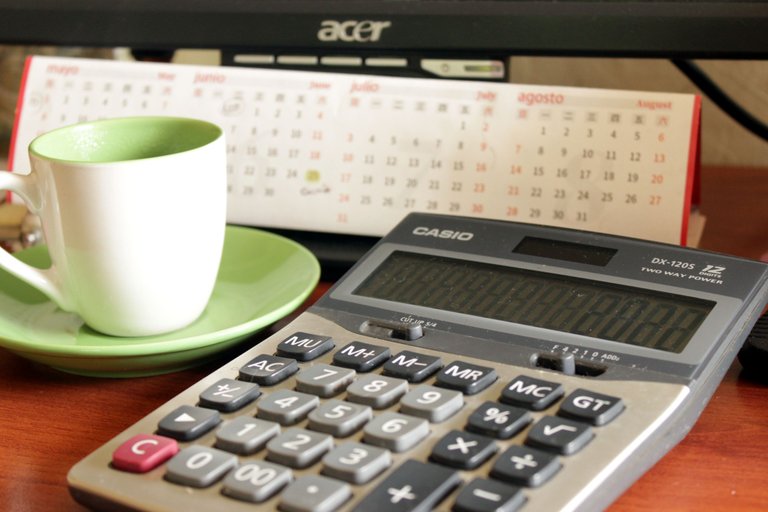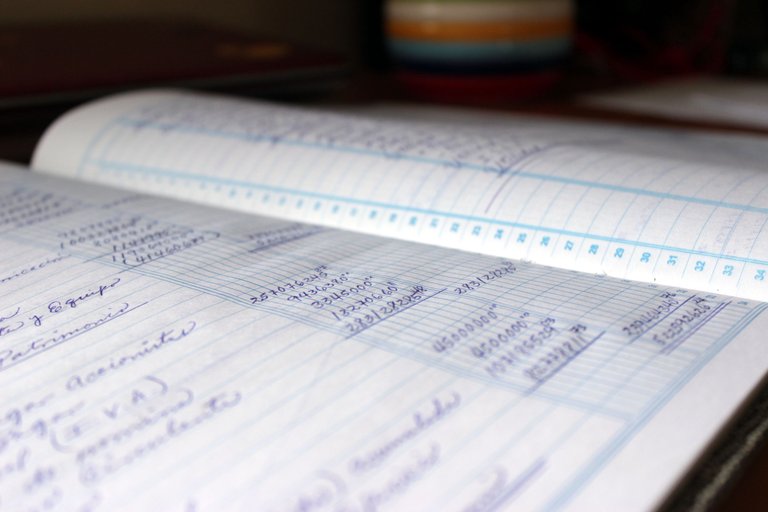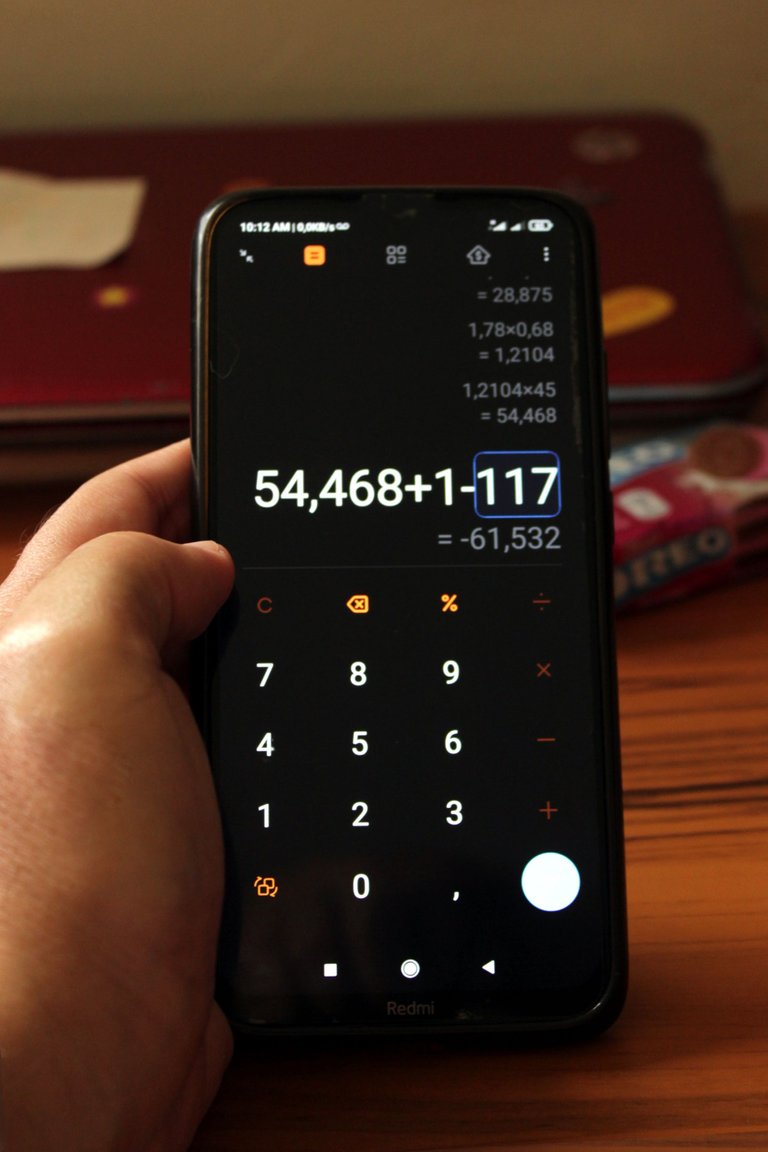Family budget - Why, what for? 💸 [ENG-ESP]
Greetings! Recently I was talking to a neighbor about the importance of keeping a family budget, keeping records of all the money that comes in and goes out of the family nucleus. As it happens on several occasions with this topic, I get that I do not know how to do it, what it is for and what are the benefits. Are you one of those who have preconceived ideas about it? I invite you to read why I recommend a family budget, how to do it in a simple way and how you can benefit from it. All images are mine, using my Canon EOS Rebel t3i camera
¡Saludos! Recientemente hablaba con un vecino de la importancia de llevar un presupuesto familiar, llevando registros de todo el dinero que entra y sale en el núcleo familiar. Tal y como sucede en varias ocasiones con éste tema, me consigo que no se sabe cómo hacerlo, para qué sirve y cuáles son los beneficios. ¿Eres de los que tiene ideas preconcebidas al respecto? Te invito a leer por qué recomiendo un presupuesto familiar, cómo hacerlo de forma sencilla y cómo pueden salir beneficiados. Todas las imágenes son mías, usando mi cámara Canon EOS Rebel t3i
What is a budget?
I would say it is an estimate of the money needed to cover some expected expenses in a given period of time. It can be kept on paper and pencil, in digital files on electronic devices and even in applications designed for that purpose.
What are some of the advantages of using it?
It gives you real and accurate knowledge of the family's finances. I'm sure you think you know this, but it's not quite true. Let's see, a basic question: Do you know exactly how much the family income was last week? Do you know exactly how much money was spent on, for example, food? A basic thing in business is to know how much money is coming in and how much is going out. It's basic! Otherwise, many would quickly go bankrupt. Well, with families it's no different.
Helps to set priorities. By knowing how much money we have, we will be more aware of the need to make the best use of it, covering all the necessary fronts that the family needs, so as not to neglect the most important things just because we have run out of resources.
It brings peace of mind. Of course, because having this important knowledge that numbers provide will make you have control over money, not money controlling you.
It avoids arguments and misunderstandings. The typical scene of the couple complaining to their partner: "There is no money? And what has it been spent on? " Wrong, wrong, wrong... let's avoid that. One of the best answers we can give is: "Here it is, check the budget. " Top note!
It helps children have a balanced view of money and encourages saving. Parents who manage money well and avoid arguing about it set a good example for their children, making them see that money is only a means to an end.
¿Qué es un presupuesto?
Diría que es una estimación del dinero que se necesita para cubrir algunos gastos previstos en un lapso determinado de tiempo. Puede llevarse en papel y lapiz, en archivos digitales en dispositivos electrónicos y hasta en aplicaciones diseñadas para eso.
¿Cuáles son algunas de las ventajas en usarlo?
Te da un conocimiento real y exacto de las finanzas de la familia. De seguro uno cree que lo sabe, pero no es del todo cierto. A ver, una pregunta básica: ¿sabes exactamente cuánto fue el ingreso familiar de la semana pasada? ¿Sabes exactamente cuánto dinero se gastó en, por ejemplo, alimentos? Algo básico en las empresas es saber cuánto dinero entra y cuánto sale. ¡Es básico! De lo contrario, muchas irían rápidamente a la quiebra. Bueno, con las familias no es distinto.
Ayuda a fijar prioridades. Al saber con cuánto dinero se cuenta, estaremos más conscientes de la necesidad de aprovecharlo de la mejor manera, cubriendo todos los frentes necesarios que necesita la familia, para no descuidar lo más importante sólo porque se nos acabaron los recursos.
Aporta tranquilidad. Claro, porque al tener éste importante conocimiento que dan los números hará que tengas el dominio sobre el dinero, no que el dinero te domine a tí.
Evita discusiones y malentendidos. La típica escena de la pareja reclamándole a su compañero: "¿No hay dinero? ¿Y en qué se ha venido gastando?" Mal, mal, mal... evitémonos eso. Una de las mejores respuestas que podemos dar es: "Aquí está, revisa el presupuesto". ¡Nota máxima!
Ayuda a los hijos a tener un punto de vista equilibrado del dinero e incentiva el ahorro. Los padres que administran bien el dinero y evitan discutir por eso le dan un buen ejemplo a sus hijos, haciéndoles ver que el dinero es sólo un medio para un fin.
Why some people don't like to use it?
Overconfidence. "I plead guilty, Your Honor ". Yes, some of us simply believe we have that under control. Imagine my case: I am a CPA by profession with several years in the field, and you think it is unnecessary. How different things look when you wear it!
Culture. Some cultures are not known for being thrifty, administrators and for keeping things "in black and white". Rather, not a few hear things like: "Money is for spending", "If I need it, I buy it", "As it comes out, we solve", "Life is only one, and tomorrow we do not know if we will be alive", "It's my money and I spend it as I want". No wonder the piggy banks in the form of piggy banks are gathering dust and cobwebs in the corner stores.
They don't want to look weak. Yes, some people think that keeping a budget is for those who need more self-control and willpower. Really?
They think it's only for those with low incomes. If this were true, no rich or middle class person would fall into sudden (or gradual) poverty by squandering their resources or making bad decisions or setting their priorities wrong.
My experience.
Around 2016 the family budget kept us afloat. We kept track of all the money coming in and going out. It helped us spot the money that was merited to cover the basics and also those things we couldn't afford to buy or invest, for now. Some people would say to me: "Why do that, if prices go up every day? How can I know what the prices will be at the end of the month? True, but the budget was not to know how much things will cost in a month, it is to know how much I can spend in a month. It is the only aspect that is in my power and control, and the wonderful knowledge of numbers would give us the criteria to manage in the galloping hyperinflationary economy. In those years we lacked nothing, thank God, timely help and the family budget.
¿Por qué algunos no les gusta usarlo?
Exceso de confianza. "Me declaro culpable, Su Señoría". Sí, algunos sencillamente creemos que tenemos eso bajo control. Imagínense mi caso: Contador Público de profesión ya con varios años en el ramo, y uno cree que es innecesario. ¡Qué diferentes se ven las cosas cuando lo llevas!
Cultura. Algunas culturas no se caracterizan por ser ahorradores, administradores y llevar las cosas "en blanco y negro". Mas bien, no pocos escuchan cosas como: "El dinero es para gastarlo", "Si lo necesito, lo compro", "Conforme va saliendo, vamos resolviendo", "La vida es una sola, y mañana no sabemos si estaremos vivos", "Es mi dinero y lo gasto como yo quiera". Con razón están las alcancías en forma de cochinito agarrando polvo y telaraña en las quincallerías.
No quieren parecer débiles. Sí, algunos piensan que llevar un presupuesto es para aquellos que necesitan tener más autocontrol y fuerza de voluntad. ¿En serio?
Creen que es sólo para los que tienen bajos ingresos. Si esto fuera cierto, ningún rico o persona de clase media caería en la pobreza repentina (o paulatina) por despilfarrar sus recursos o tomar malas decisiones o fijar sus prioridades de forma equivocada.
Mi experiencia.
Alrededor del año 2016 el presupuesto familiar nos mantuvo a flote. Llevamos cuenta de todo el dinero que entraba y salía. Nos ayudó a detectar el dinero que se ameritaba para cubrir lo básico y también aquellas cosas que no podíamos darnos el lujo de comprar o invertir, por ahora. Algunos me decían: "¿Para qué hacer eso, si los precios suben todos los días? ¿Cómo puedo saber cuál serán los precios a final del mes? Es cierto, pero el presupuesto no era para saber cuánto costarán las cosas en un mes, es para saber cuánto puedo gastar yo en un mes. ¡Es muy diferente! Es el único aspecto que está en mi poder y control, y el maravilloso conocimiento de los números nos daría el criterio para manejarnos en la galopante economía hiperinflacionaria. En esos años no nos faltó nada, gracias a Dios, la ayuda oportuna y el presupuesto familiar.
How to make a budget?
It's simple. It's uncomplicated. I do it this way:
1-. Take one month as a base. During those thirty days I take note of all the money that comes in and all the money that we spend, noting its concept, whether it is food, medicine, candy, airfare, etc.
2-. The amounts are totaled at the end of the month. Get ready! The numbers will give you one of your family's best kept secrets: do we really spend all that money! If you're surprised by the amount you spent on candy and sweets, don't worry, you won't be the only one. Here you will surely realize that you were missing a lot of financial information. But that's it, you've got it, now let's make some decisions!
3-. Categories are created.. Now that you know what the family spends, then create the number of categories you think you need. I suggest not too many. Then you can use, for example: food, rent, telephones and internet, medicines, tickets, maintenance... whatever your family uses. Ah! Don't forget an important one: Sweets and treats. Of course, it will be very useful that you take into account which will be fixed expenses, which you will probably have to cover month to month almost obligatorily. There would be the rents, the insurance fee, payment of services, payment of some credit or loan, etc.
4-. The amounts are fixed. Now that you know how much is your income, you can distribute it in the categories you created. Some of them will be easy, because we know which are the fixed expenses, which usually also have an established amount, such as rent and payment commitments. Then, with the others you will set an appropriate amount. Are you realizing that you want to spend less on some items? It is the moment to make that adjustment.
5-. Prepare for the future. Please remember to set aside an amount for "savings" or "investments". How am I going to save with so much to spend, and I'm barely making ends meet? " That's a reasonable doubt, but if we expect to save when we have money left over, we probably never will. Set aside an amount even if it seems tiny to you. You'll find that you'll be able to set it aside month after month, and you'll be surprised how it can grow as you try to ignore it. We have a head start: why not save on HIVE or HBD? From your own Wallet you can set them aside, even if it's a small amount. Don't underestimate this valuable criterion.
6-. Execution and control. In this new month, where you will already have the budgets of each category, try to stick to it and keep a good attitude. It is possible that, because it is the first month, the amounts are not so accurate, making you have too much money in some categories and too little in others. If this happens, you will have a chance the following month to adjust it, so avoid taking money from one category to use it in another!
¿Cómo hacer un presupuesto?
Es sencillo. Sin complicaciones. Yo lo hago de ésta forma:
1-. Tomo un mes como base. Durante esos treinta días tomo nota de todo el dinero que entra y todo el dinero que gastamos, anotando su concepto, si es alimentos, medicinas, golosinas, pasaje, etc.
2-. Se totalizan los montos a fin de mes. ¡Prepárate! Los números te darán uno de los secretos mejores guardados de tu familia. ¡¿Realmente gastamos todo ese dinero?! Si te sorprende el monto de lo que gastaron en golosinas y dulces, tranquilo, no serás el único. Aquí de seguro te darás que te faltaba mucha información financiera. Pero listo, ya la tienes. ¿Y ahora? ¡A tomar decisiones!
3-. Se crean las categorías. Ahora que sabes en qué gasta la familia, entonces creas el número de categorías que creas necesarias. Te sugiero que no sean muchas. Entonces puedes usar, por ejemplo: alimentos, alquiler, teléfonos e internet, medicinas, pasajes, mantenimiento... las que tu familia use. ¡Ah! No olvides una importante: Dulces y golosinas. Por supuesto, será muy útil que tengas en cuenta cuáles serán gastos fijos, que probablemente debas cubrir mes a mes casi de forma obligatoria. Allí estarían los alquileres, la cuota del seguro, pago de servicios, pago de algún crédito o préstamo, etc.
4-. Se fijan los montos. Ahora que ya sabes cuánto es tu ingreso podrás distribuirlo en las categorías que creaste. Algunas será fácil, porque sabemos cuáles son los gastos fijos, que suelen tener también un monto establecido, como ese alquiler y compromisos de pago. Entonces, con las demás le fijarás un monto adecuado. ¿Te estás dando cuanta que quieres gastar menos en algunos rubros? Es el momento para hacer ése ajuste.
5-. Prepárate para el futuro. Por favor, recuerda apartar un monto para "ahorros" o "inversiones". "¿Cómo voy a ahorrar con tanto en qué gastar, y apenas llego a fin de mes?" Esa duda es razonable, pero si esperamos ahorrar cuando nos sobre dinero, probablemente nunca lo hagamos. Aparta un monto aunque te parezca ínfimo. Verás que podrás apartarlo mes a mes, y te sorprenderás cómo puede crecer al tratar de ignorarlo. Nosotros tenemos ventaja: ¿por qué no ahorrar en HIVE o en HBD? Desde tu propia Wallet puedes apartarlos, aunque sea un pequeño monto. No subestimes éste valioso criterio.
6-. Ejecución y control. En éste nuevo mes, donde ya tendrás los presupuestos de cada categoría, trata de ceñirte a él y mantén una buena actitud. Es posible que, por ser el primer mes, no estén tan atinados los montos, haciendo que en algunas categorías te sobre mucho dinero y en otros te falte mucho dinero. Si esto ocurre, tendrás oportunidad el mes siguiente para que lo ajustes. ¡Evita por todos los medios tomar dinero de una categoría para usarla en otro!
If you read my post from end to end, I'm honored. And that says about you that you really care about getting the most bang for your buck and evaluating yourself in this field. It can tell you that budgeting will benefit you in a big way. Mainly, it will help you focus on more important things, like family, health, spirituality, rest.... Money will come and go. It is beneficial if it is a family topic, an open topic. In this way all family members will know what is expected of each one, and that everyone can do something for the good execution of the budget. Money will not be more important than it should be.
What do you think now, is the family budget something for you?
Si leíste mi post de punta a punta, me siento honrado. Y eso dice de tí que realmente te importa aprovechar bien el dinero y evaluarte en éste campo. Puede decirte que llevar presupuesto te beneficiará en grande. Principalmente, te ayudará a enfocarte en cosas más importantes, como la familia, la salud, la espiritualidad, el descanso... El dinero vendrá y se irá. Es beneficioso que sea un tema de familia, un tema abierto. Así todos los miembros de la familia sabrán qué se espera de cada uno, y que todos pueden hacer algo para la buena ejecución del presupuesto. El dinero no tendrá más importancia de la que debería.
¿Qué opinas ahora? ¿Es el presupuesto familiar algo para tí?
😎
My social media / Mis redes sociales





Excelente post, bastante explícito y muy necesario. Realmente valoro que hayas compartido tus conocimientos con la comunidad.
Por mi parte voy a utilizar tus consejos para empezar a organizar mejor mis finanzas
Me ha gustado escribir este tema que me gusta, y aún mas con comentarios como éste. Es algo que recomiendo altamente y no tiene por qué ser complicado. Yo lo llevo en una hoja Excel, donde mi wsposa tambien tiene acceso. Estoy seguro que también te será de provecho. ¡Éxito! @mamaemigrante
Keeping family or personal budget are really important, it helps save you all unnecessary expenses and setting priorities.
Thank you for sharing
No doubt it is. Perhaps it is an undervalued subject. It seems to be more fun to spend money than to manage it.🤣 Thanks for your valuable comment @graciousvic
Very true 😂
Like money runs
Hard to get, easy to spend
But with what you listed here, am sure i will be able to mange my finance ☺️👍
Excelente post @aaalviarez hace años lo vengo haciendo, pero siempre es positivo aprender nuevas estrategias con sus claves incluidas para tomar consciencia con sus detonantes del consumo para evitarlos.
Gracias por esta oportuna y valiosa información y puesta en marcha de como el consumismo te atrapa, como evitarlo y ser feliz sin el sobre consumo, ampliando mis horizontes y des mercantilizando mi vida.
Que tengas un gran día.
Qué chévere que usas presupuesto, definitivamente es otra cosa. Uno fácilmente puede saber cuánto dinero entra y cuánto dinero sale. Esos detonantes del consumo podemos intentar mantenerlos a raya de una mejor forma. Agradecido por dejar tu importante comentario, lo cual me anima y ayuda a seguir trabajando con empeño @janitzearratia
Gracias por tu publicación @aaalviarez es necesario el presupuesto familiar, pues nos ayuda asegurarnos de lo más importante y evita malgastar lo que no podemos darnos el lujo de hacer... Además nos ayuda a evitar las discusiones en la familia por no saber en qué se va el dinero.
Concuerdo contigo que es esencial en tiempos de inflación, escases de trabajo y de ingresos.
Exitos.
Ciertamente @jossalvia . Y será muy importante que sea realista. Cada familia tendrá sus características. Además los precios de bienes y servicios varían de un lugar a otro. El conocimiento de los precios locales ayudará a tener un buen criterio desde el principio. Por supuesto, siempre se podrá ajustar.
Un abrazo